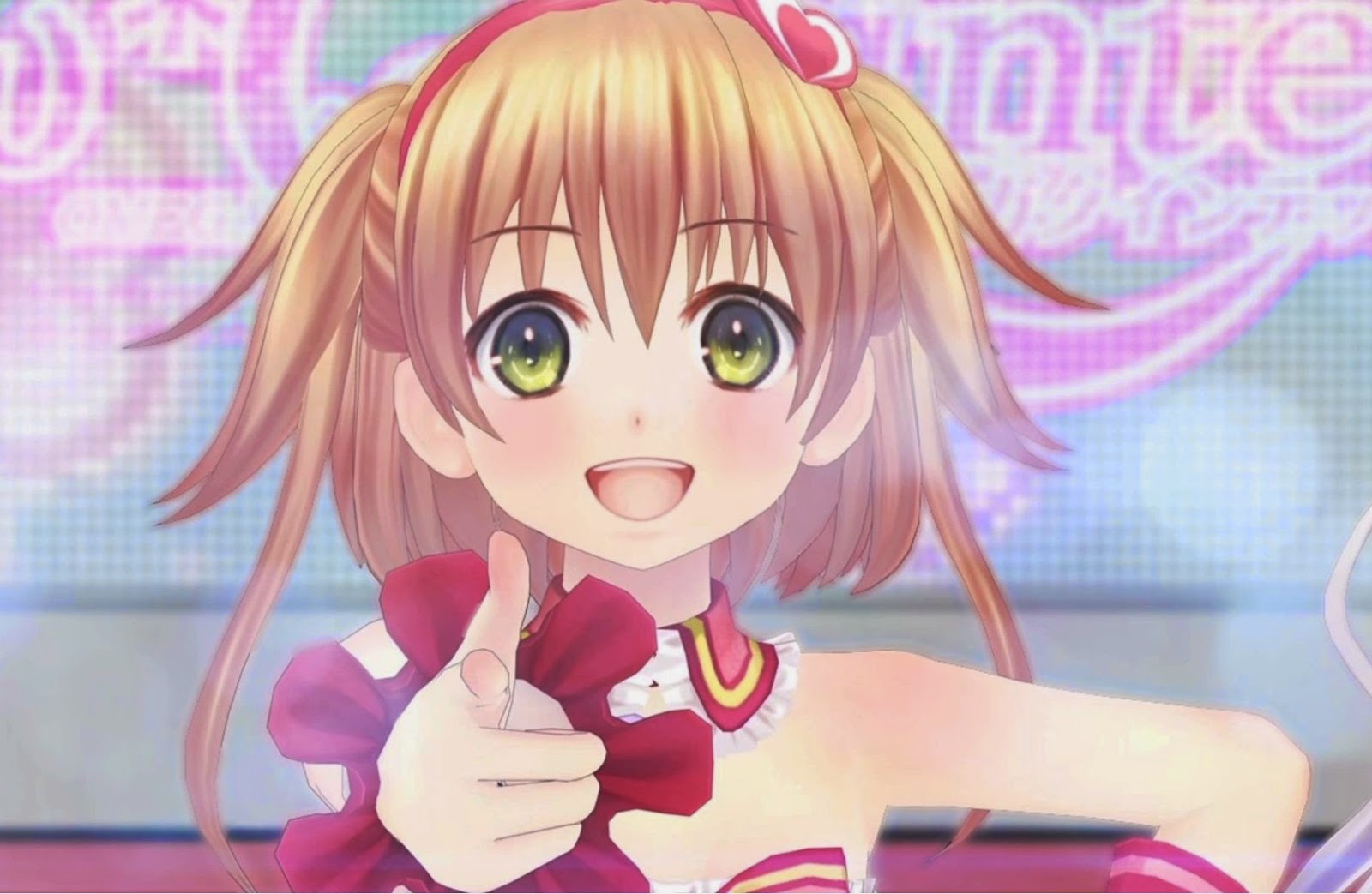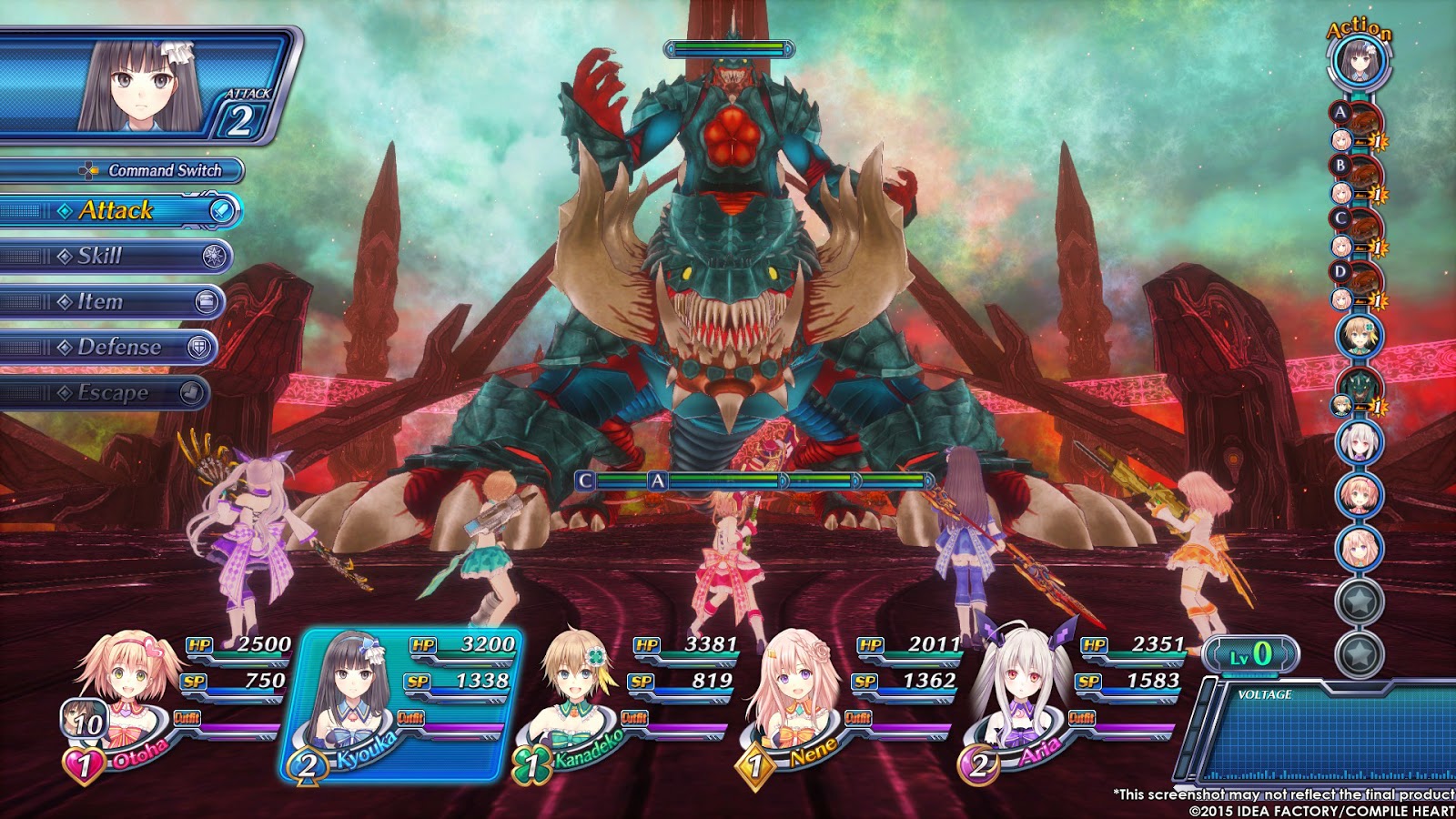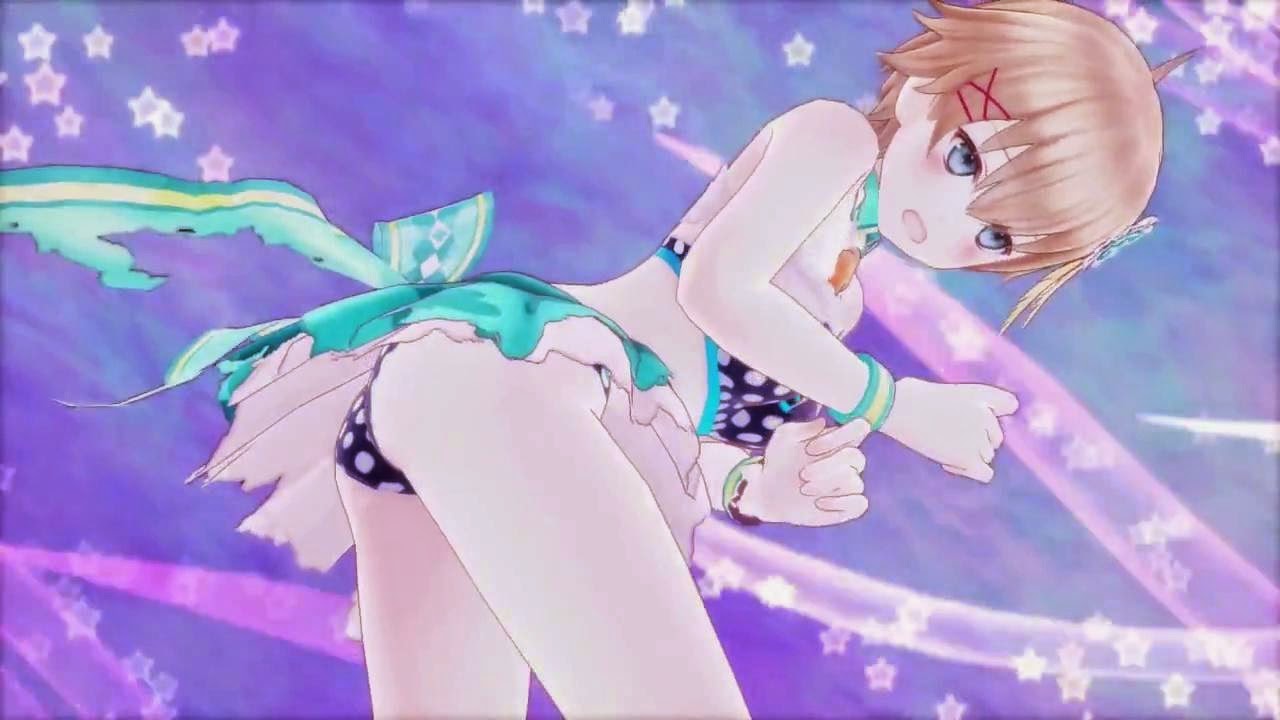It took a while for the Japanese developers to really start jumping on board with the PlayStation 4, with the first year of the console’s existence being marked very heavily with games from western developers, but only a few notable examples from Japan.
Now, though, after a truly spectacular couple of weeks of releases from Koei Tecmo, Bloodborne and Dark Souls II, and the first Final Fantasy game on the platform from Square Enix (not including the MMO, Final Fantasy XIV, of course), the Japanese games are landing on the PlayStation 4 in an veritable flood. But there was still one piece missing; the JRPG for the otaku. Before Omega Quintet, developers like Compile Heart, NISA and Koei Tecmo’s own GUST development team had been quiet about their plans for the new generation of hardware.
But now Compile Heart’s Omega Quintet is on the console, and the jigsaw is complete. Now we’re witnessing a piece of hardware in full flight, and you could not ask for a more appealing library of games than what is now available on it.
Omega Quintet is, of course, a new IP for the maverick developers from Tokyo’s Ikebukuro. And yet it is almost safe in its familiarity, because Omega Quintet is thematically very similar to the Hyperdimension Neptunia franchise that has become the developer’s marquee property. Where the Hyperdimension Neptunia franchise is an extended parody of the video games industry, Omega Quintet is an extended parody of the idol culture in Japan, and the thematic cross-overs are immediately noticeable.
Japan’s idol culture is a contentious one. Perhaps best known through the its most significant product, AKB48, the idol culture is carefully constructed to pander to the obsessives. Though nominally a music group, AKB48’s fans support the group (which changes on a yearly basis as members of the 48-strong group are ‘graduated’ and are replaced) not for its music, but rather the carefully constructed virginal-but-sexy image that each girl is carefully constructed to epitomise. People purchase merchandise and CDs solely to grab tickets to the girl’s events. They line up for hours for the opportunity for one of the girls to walk past.
The entire business model of these idol groups is about its fans being able to project their little sister or girl-next-door fantasies on to the girls, in other words. And it’s arguable that these groups are neither healthy for the fans, nor the girls themselves. They sign up with dreams of stardom, but rarely end up with the kind of celebrity that they dream of. Further, the pressures put on these groups through their rules of behaviour are oppressive. There’s a strict no dating rule, for example, which has led to any number of controversies over the years, but cumulated with one girl shaving her head in shame as an apology to fans for being caught dating a boy. Furthermore, the girls are “ranked” each year through a fan voting system, which turns them into a commodity, and judges them on a set of criteria that has nothing to do with their musical ability (you can get the voting slips for your favourite girl by – you guessed it – buying CDs. Seriously, people buy boxes of the same CD just to try and stack the odds so their favourite girl wins the popularity contest).
This entire culture is what Omega Quintet parodies through its narrative, with repeated jabs towards idol culture, its fans, and the expectations placed on the girls. The tone is set immediately, as players take control of a young girl and her male friend who find themselves trust into the lifestyle of idoldom when a bunch of a monsters start to attack humans, and it’s discovered that only a rare few with a gift for magical music have the ability to fight back. These girls become heroes to the people, to the point where crowds will risk their lives in order to watch them “perform” (fight). And this young girl is discovered to have such an ability.
She joins with a small group of other idols, and they go about solving quests and protecting the people by fighting these monsters. Jokes abound at the expense of the girl’s male friend and whether it’s appropriate for him to be living in the same hotel-turned-base of operations as a group of teen girls aside, the narrative is a fairly standard one of growing from innocence to power, battling rats, through to taking down the mightiest of demons.
It does not take too long for the male character to be backgrounded however. He’ll show up as a support attack, and you’ll hear him chatting along to the characters, but his role in the narrative is a catalyst, rather than a focus. The focus is absolutely on the girls throughout Omega Quintet; they are the ones on the screen during conversations, the ones you’ll be controlling on the gameplay field, and the ones you’ll be commanding in combat. Each of them has a personality distinct from one another (though in true Compile Heart style they’re all designed to be ditzy and kawaii in equal measure).
For anyone who has played a Hyperdimension Neptunia game before, the personalities and sense of humour will be immediately comfortable and familiar. The jokes occasionally veer towards the tasteless – especially when you consider the reality of the idol lifestyle behind the humour – but for the most part it’s charming, silly, entertaining stuff. My only concern when it comes to this game’s western release is whether the audience will be fully receptive to the humour.
With Hyperdimension Neptunia, it was “easy” to understand the context of the humour, because everyone who has ever had an interest in games knows the politics of the game console fanboy wars. Everyone knows the “personalities” of Sony, Nintendo and Microsoft. And so when a narrative lampoons these things, then we we’re able to be taken along with the joke.
But the idol culture does not exist in the west. It’s common to plenty of Asian cultures – Korea, China and Indonesia all have these kinds of idol groups, but they simply do not exist in the west in this format. This suggests to me that the west does not really understand the appeal behind idols, and therefore people from our cultures playing Omega Quintet will not necessarily find the game as humorous out of context. There’s still plenty of the standard anime humour tropes in there, and I hope it’s enough to catch the attention of players, but it’s only really the people who have taken the time to get to know the idol culture of Japan that will really realise how deeply satirical Omega Quintet really is.
Of course, satire also means nothing unless it’s making a point of it all, and I’d argue that Omega Quintet is very careful to pass light criticism on the idol culture without outright attacking it, and potentially offending the people who genuinely like this stuff which. Because let’s face it, the idol culture is also often Compile Heart’s target demographic. But the story writers are careful not to outright celebrate what’s going on. For one example, as with Lollipop Chainsaw before it, the game offers free control of the camera, which means you can tilt it to a low angle. The girls are wearing short skirts, but rather than letting players score themselves an eyeful of underwear, tilt the camera too low and they’ll cover themselves up and yell at the player to stop.
Of course people looking to get a look can simply press the jump button, which makes the skirts fly everywhere anyway, and cut scenes have their fair share of drawings of half-dressed girls because a Compile Heart game would not be complete without fanservice. But it’s clear that the developers want to draw attention to the sexualisation of innocence that happens in the idol industry, and I think they have achieved that here. The game itself might not be as critical of it all as many (especially here in the west) would like, but Omega Quintet certainly provides the context to enable a discussion about idol culture.
The game itself is overwhelming at first. Actually, that’s an understatement – if there’s one thing Compile Heart needs to do, it’s explain its mechanics in a better manner, and at a better pace. People criticise Final Fantasy XIII for still throwing tutorials at players a dozen hours into the game, but the reality is that’s better than overloading the players with an endless stream of tutorial screens within the first hour. Omega Quintet has a fairly complex combat system, and with all my experience playing JRPGs (and, indeed, Compile Heart JRPGs), I still spend the opening chapters of the game floundering and trying to figure what, exactly, I was meant to be doing to improve the fighting standard of my players.
Once I had a hang of the system, I fell in love with it. It’s clearly inspired by music, but unlike a game such as those in the Ar Tonelico series, Omega Quintet offers a very abstract way in bringing music and combat together. Enemies and the players are arrayed on opposite sides of a battlefield that has been split up like the staves of a music score and they take turns to attack one another (this is a traditional turn-based combat system in terms of its foundation). Weapons and special abilities have an ideal range, where they’ll do additional damage if the enemy is on that “line” of the staff, and they’ll take less damage if they’re too close, or too far away from the opponent.
Additionally, rhythm is important, with numerous attacks changing around the order with which allies and enemies have their turns. At certain points a boost or debuff will occur, and key to the strategy of Omega Quintet is manipulating the turn order so that your characters get the buffs, while the debuffs cripple the enemies.
Once you get a hang of the combat system, it becomes something both engaging and strategic, with difficulty spikes hitting hard at all the right moments to ensure that you’re making the most of the system. With some practice, it also becomes a highly rhythmic, graceful system. These are words I would never have thought could be applied to a turn-based system, but Compile Heart really has pushed the mechanics of turn based combat as far as they can be pushed here. It’s genuinely dynamic, and it’s a rewarding system to master.
On top of that there are full, deep skill trees and weapon proficiencies to take into account, and characters that take too much damage can have their clothes torn off in battle, leaving them in their underwear. And that’s as embarrassing for the girls as it is bad for their chances of surviving in battle. Remember – because they’re idols they are performing in front of people!
Later on it becomes important to design dance routines for the girls, and that’s a game in itself, as you’ll need to select from a massive range of dance moves for each girl and then decide on camera angles to build a compelling, dynamic video clip. This is time consuming and itself very poorly explained in its tutorial, but once you get the hang of this it’s a truly hilarious change of pace from the combat. You can hurl bombs at the girls and the way they’re knocked off the stage is pure Looney Tunes insanity, for just one example.
Small mercy given all this complexity, then, that levels themselves are small, easy to navigate, and straightforward. Various areas are blocked off until your characters are of a certain level of experience, but the game is designed in such a way that you’ll have access to these areas when you need them. It’s an artificial contrivance, but the level design never tries to be organic like you would see in something like Bloodborne.
And while we’re comparing to other PlayStation 4 games, it must be said that Omega Quintet hardly pushes the hardware. It looks like a step ahead of what Compile Heart achieved on the PlayStation 3, with better quality animation and cleaner, sharper lines displayed during the cut scenes and character conversations, but at the same time, I look at the beauty of a game like the Final Fantasy XV demo and it’s blatantly obvious that Omega Quintet comes to us from a much smaller team with a far smaller budget. All of Compile Heart’s standard complaints apply here, too; the developers simply can’t be bothered getting frame rates under control. It doesn’t annoy me on a personal note, but I’ve read enough reviews and fan comments about the Compile Heart games to know that they go get announced by the lack of technical proficiency on display at times.
But to let the technical issues affect your opinion of Omega Quintet is to miss the point. This isn’t a blockbuster. This is, effectively, an independent game from a small, creative team. And it’s a massive success at being that. It’s a deep JRPG mixed with both satire and humour, it’s something you haven’t seen before, and most importantly: it’s fun. Real, genuine fun. Buy it.
– Matt S.
Editor-in-Chief
Find me on Twitter: @digitallydownld














